- Home
- Rudy Rucker
As Above, So Below Page 11
As Above, So Below Read online
Page 11
“Very harmonious,” said Bruegel, cursorily eyeing one of the maps. The lack of response was disappointing, as Ortelius had secretly hoped for an artist-to-artist discussion of his color choices. But Bruegel’s next sentences restored his spirits. “Let’s be on our way, Abraham. We can have a little discussion on the way to the Schilderspand. Good day, Anja, I’ll be back in a few hours.”
“I’ll clean our new room and bring my things from the Vanderheydens,” sang Anja. “And I’ll fix us a dinner. Will I be able to get a brazier of coals to bring up to our room this evening, Mijnheer Cock?”
“God save me from this country bumpkin!” exclaimed Cock. “And burn down our whole quarter of the city? The common kitchen is right through that door.” He pointed across the room. “We have a big hearth and a fine stove in there. Everyone brings their cook pots down in the evening. My wife, Katharina, will show you where everything is.”
“I’ll make us a fish and mussel stew with potatoes and cream,” said Anja. “Perhaps I’ll even find some nutmeg.” She kissed Peter on the cheek. “You look very handsome today.”
“Lucky man,” said Franckert. “A hot meal from a loving maid. I’ll accompany you and Abraham to the Schilderspand too.”
“Well, if you don’t mind, Hans, I have something rather personal to discuss with Abraham,” said Bruegel. “But you can meet us over there in a bit, if you like.”
“Putting Abraham ahead of me again!” said Franckert, slightly put out. “If our timid bachelor seeks advice about the ladies, he’d do better to ask me.” He turned his attention back to Jerome Cock. “Print me a Belgian Wagon while I’m awaiting these gentlemen’s pleasure, Jerome. I’ll have the first impression of this new state! Hang it right here on the drying line, and mark it down as sold to Hans Franckert.” He stepped towards the kitchen door and called to the maid. “Liesl! Another cup of coffee for me!”
Ortelius and Bruegel stepped around a pile of engravings packaged up for shipment and made their way out into the street. There was a break in the clouds with the sun peeping brightly through, making the snowy scene glisten. Bruegel’s coat was a rich blue in the sun.
Most goods in Antwerp were sold at daily markets or at the great seasonal fairs, so there weren’t so very many shops. Down the block was a combined barber and druggist, and on the other side of the street was a tailor. Just ahead of Bruegel and Ortelius, two men were pushing along a huge barrel of beer mounted on a freight sleigh, their feet slipping on the wet, trodden cobblestones.
As soon as they were out of earshot of the Four Winds, Bruegel whispered urgently to Ortelius. “Forget what we said at the Blue Boat about Anja and me being raised in the same home. I didn’t realize that Anja would soon share my bed. I was blind to the strength of our old attraction.”
“You can trust me,” said Ortelius. “Just as I trust you with my secret.” He felt a thrill at being on an equal footing with the artist. The two of them were sinners of the same stripe. “Anja came to you last night?”
“I welcomed her more warmly than I’d known I would,” said Bruegel. “She’s so comfortable and wanton. She even lets me watch her on the chamber pot. My village girl.”
“Do others know you were raised together?”
“You’re the only one in Antwerp, Abraham, unless she’s blabbed it about, though she says she hasn’t. I’ve told her that no one should hear of our past. I’m sure it’s no sin for me to be with her, but gossip could twist things around. The new Spanish priests are so harsh.”
“You’re easy in your own conscience?”
“I think I am. Though perhaps it’s sloth and lust that make me think this way. I’ll pray and meditate upon it. In any case, I wouldn’t want to marry Anja. Nor does she wish to marry me.”
“How do you know that?” asked Ortelius.
“She said so.”
They were on a wider street now, and a horse-drawn wagon of potatoes went rumbling past. The two men had to step lively to keep from getting splashed with icy slush.
“I’ve little experience with women,” said Ortelius when they could speak again. “But I’d be surprised if Anja doesn’t have some hope to wed you after all. Perhaps she knows better than to yank the line as soon as her fish swallows the hook.”
“I really hadn’t planned to have her move in,” said Bruegel, fingering his cap. “In any case, I’m glad I can trust your discretion about her origins. It’ll be bad enough when Mayken Verhulst hears I’m living with a serving maid, but if she knew that—” Bruegel sighed and changed the subject. “How do you like my Large Landscapes?”
“Very well indeed. They’re honest, they show true forms. Seeing them hung near the maps set me to thinking about the similarities between the two. The shapes on maps are the same shapes that one finds in a landscape. River valleys are like the branches of trees, seacoasts are like the silhouettes of rocks. Nature rejoices everywhere in the same palette of forms.”
“I feel a tree is more like a man’s life than like a river valley,” said Bruegel. “From moment to moment we decide what to do next, whether to do evil or to do good. We carry our own life history with us. When I look at the bends in a tree’s trunk I see the whole past of the tree: its struggles as a sapling, its passion for the sun, its thirst for water, its—”
“But I’m talking about actual visible shapes,” interrupted Ortelius. He stopped and pointed down at a puddle in the street. Snow was melting into it, and at one end the puddle was overflowing. “The shape of that rivulet of water, thick and bent near the puddle here, and sinuous and lean over there? It’s very like the river Scheldt on the map of Flanders, is it not?”
“True,” said Bruegel, squinting his eyes and cocking his head. “And if that’s the Scheldt, then those chunks of ice in the puddle are the Zeeland archipelago in the North Sea.”
“As above, so below,” said Ortelius. “Your phrase, Peter. A rock is a mountain in small, and each woman or man is the world in miniature.”
“Many worlds,” mused Bruegel. “Many mirrors.”
They were just crossing a bridge over a frozen canal. There were scores of people on the ice, most of them wearing long curving wooden skates strapped to the bottoms of their shoes. A wealthy fellow with a somber look had a servant towing him about by the hem of his cape. A tiny child sat in a little skate-sled poling herself along with sticks. Some boys and girls used bent sticks to play a game of hockey. An amorous man held a woman by the waist.
Across the bridge was the impressive pile of the new Stock Exchange, with its great stone columns. The St. Luke’s Guild rented the second floor for the permanent painting market called the Schilderspand. As they drew close to the building, Bruegel grew quiet and thin lipped. Perhaps he was nervous about making his deals.
“I was here just last week,” offered Ortelius to lighten his friend’s humor. “I’ve been collecting small paintings of exotic animals to add to my curiosity cabinets.”
“Ah, your ‘museum,’ ” said Bruegel distractedly. “With your coins and your medals and your shells. I’d like to see it.”
“Then come by this afternoon while there’s still good light.”
“I will, if I remember. Oh, Abraham. My blood’s overheated. I can hardly believe I’ve yoked myself to Anja. What was I thinking? And now I’m to negotiate three commissions? Interrupt me if I begin gibbering like an ape.”
“You’ll do fine, Peter.” Ortelius was starting to realize that Bruegel worried more than his calm appearance might indicate.
The Schilderspand, or Painter’s Market, was a plain upstairs hall with white-plastered walls and an ordinary oak-plank floor. It was brightly lit by gable windows set into the slanting ceiling. Several half walls rose up some twenty feet towards the ceiling, dividing the space into galleries. Every vertical surface was completely covered with framed paintings by the local Flemish masters.
There were any number of cosmic landscapes with hills, rivers, mountains, and lakes. The scenes were all composed in th
ree horizontal strips: blue at the top for the background, green for the middle ground, and brown for the foreground strip at the bottom of the canvas. The landscapes were populated by dainty figures from Scripture and myth, by saints and philosophers, by patrons and kings. They wore robes, togas, loincloths or, in the case of patrons, huge lace collars, and the folds in the cloth draperies were always clearly limned. The same cast of costumed characters appeared in the deep perspectives of the Italianate cityscapes that hung side by side with the landscapes.
Not all the pictures showed mundane fields and towns. There were a few Heavens and Hells: the Heavens featuring pink marzipan angels before the great white disk that stood for God; the blue-demon-filled Hells aglow with the evil light of burning cities.
But overwhelming every other category of paintings was an endless glut of explicitly religious art, a bright and meaningless diarrhea of Jesus, Mary, the Apostles and the saints, over and over and over and over again.
The Guild painters loitered beneath the thousand images, gossiping about their craft and keeping a sharp eye on the wandering patrons and connoisseurs.
Still at Ortelius’s side, Bruegel looked very nicely turned out, his shirt and trousers still tidy, his dark blue coat falling in rich folds, his cap nicely adjusted. But his face looked a little wild, his gray eyes so wide open that the light made them almost blue. When someone suddenly spoke to him, he jumped.
“Hello, Bruegel!” It was Frans Floris, velvet clad and suave, his waxy face yellow against his enormous lace collar. The wall behind him was filled with smoothly executed paintings from his workshop, all the same size. It was like a crate of perfect fruit. Floris had art down to a system, and he was proud of it. Though he was only eight years older than Bruegel, he was quite the wealthy master. “Are you looking for a job?” he asked. “I need another landscape man. The orders are coming in too fast for us to paint.”
“I’ve got commissions of my own, Frans,” said Bruegel, perhaps a bit louder than necessary. “Have you seen Jonghelinck, or Fugger’s secretary?”
“Commissions from financiers,” said the expansive Floris. “Very fine. Be sure to ask them to pay you a third in advance. They can afford it. And Peter, when you deliver your pictures to them, get a look at their holdings. Both of them have some wonderful pieces. Jonghelinck has over a dozen of my paintings. And I recently did a marvelous Last Judgment for Fugger, fully classical in style. My Satan is Pan with a harelip. He quite takes one’s breath away.” Floris twisted his face into an bizarre leer, demonstrating the physiognomy of his Pan. At the same time, he winked at Ortelius, including him in his audience.
Bruegel was listening so avidly that he imitated Floris’s grimace. “What else does Fugger have?” he asked.
“Oh, he has Patinirs and Dürers and even a Bosch triptych. And cases and cabinets full of coins and medals. That’s his secretary over there, the copper-colored fellow who glides about so smoothly. Calls himself Williblad Cheroo.”
Ortelius felt a shock of recognition. This was the same exotic-looking man he’d seen at the Carnival street dance last night. Williblad Cheroo. He was even more striking by daylight than by firelight. Seeing him in the flesh, Ortelius dimly recalled that he’d dreamed of him in the night. Could Williblad and Ortelius be fated to meet?
“He’s half-American,” Floris was saying. “Would you believe? I’d love to paint what Williblad’s seen. He’s the orphan child of a New World Indian and the Spanish navigator Ponce de Leon. It seems Cheroo’s mother died in childbirth, and when de Leon returned on a second mission a few years later, he was slain by the mother’s tribe. The Indians must not have liked the looks of little Williblad, for they set him aboard his dead father’s ship and sent him off to the Old World. That particular ship and its booty belonged to Anthonie Fugger, so Williblad came into the care of our Fugger, who made the boy his servant.”
“Yet he carries himself like his own man,” observed Ortelius, profoundly moved by Williblad’s elegant appearance. The bronze-skinned man was beautifully dressed in dark green velvet: knee breeches with a bulging codpiece and a jacket with puffed-out sleeves with slits in them to show the jacket’s yellow silk lining and the white linen of Cheroo’s lace-collared shirt. Exquisite.
“He’s his own man,” agreed Floris. “A devil of one. I’ve lost more than one wench to him, too. Not only is he handsome, he’s clever and highly educated. Yes, Fugger had him tutored and sent him on to the University in Leuven. He’s a man of blood and choler, Peter, a refined deal maker, but prone to giving offence. If the House of Fugger were to fall, our Cheroo would be hard put to find another job. As for your strategy with him, my experience is that the second figure he offers you is as high as he’ll go. If you try for a third, it’s always lower. Have at him, Bruegel, and good luck to you.”
“Thanks, Frans. Good Lord, but I’m shaky today. Stick with me, Abraham, and lend me strength.”
Ortelius stood quietly at Bruegel’s side while his friend began negotiating his deal with Fugger’s exotic secretary. Williblad was tall like Bruegel and looked to be about ten years older. Save for the difference in hue, mused Ortelius, Williblad might almost have been Bruegel’s older brother. But yet—what a difference. Ortelius was so dizzy with infatuation that he missed the exact moment when Bruegel and Williblad began arguing.
It was about the money. They’d quickly agreed that Bruegel’s painting for Fugger was to be The Merchants Driven from the Temple, watercolor on a wood panel, with a cityscape done Turkish style, completed and delivered in six weeks. But when Williblad named a figure, it was so much less than what Bruegel wanted that Peter quite lost his temper. And then Williblad lost his temper too, or pretended to. He turned his back and strode off, his gait as powerful and springy as a panther’s.
Seeing Bruegel’s desperate, unhappy face, Ortelius ran after Williblad and tapped him on the shoulder. Cheroo had dark, clearly delineated lips, sparkling hazel eyes and lustrous black hair. Though he spoke Flemish with no trace of an accent, there was a pleasant musicality to his speech. As a trader, Ortelius knew all about negotiations, and it was only a minute’s work to clear things up. And of course Ortelius was thrilled to have had the chance to speak with Williblad Cheroo.
No sooner was this deal resolved than Nicolas Jonghelinck appeared. Pig-headedly enough, Bruegel barely introduced Ortelius, and once again began negotiating things on his own. In this case it was to be a Nativity in watercolor on linen for Philip and an oil Fall of Icarus on an oak panel for Jonghelinck.
But unlike Bruegel’s stormy encounter with Williblad Cheroo, Bruegel’s deal with Jonghelinck went smoothly. There was no need for Ortelius to jump in as a middle-man. The rich, successful Jonghelinck had no need to try and crush a mere artist with his bargaining skills.
Ortelius mused that the roughness of Williblad’s dealing revealed a kind of awkwardness on the man’s part, a certain lack of balance. Perhaps this orphan of the New World was unsure of himself. Perhaps he needed a friend. While Bruegel’s talk with Jonghelinck flowed on, Ortelius watched Williblad Cheroo across the hall and tried to think of a reasonable pretence for going to talk to this alluring man again.
Meanwhile Jonghelinck and Bruegel had settled upon the sizes of the commissions: a very high price for Philip’s Nativity and a goodly, though lower, price for the Fall of Icarus.
“There’s no harm in gouging King Philip,” said Jonghelinck easily. “Whatever his court pays you is as a gnat’s egg beside their ravening eagle of a war loan. I have a clear conscience in telling you this, as it’s I myself who’s lending Philip the money in the first place! Though I misdoubt any Habsburg’s willingness to repay a loan’s principal, they do pay a wonderful rate of interest. This said, I have in fact sold most of my Habsburg loans to Fugger. But I’m sure this kind of thing means nothing to an artist. Let’s talk some more about your plans for the Icarus, Peter.”
“I’m planning to paint yours last,” Bruegel told Jonghelinck in a friendly tone. �
�Because you’re a fellow countryman. I’m always learning. Each of my pictures will be better than the ones before.” Now Bruegel produced a scrap of paper and roughed out a cartoon of his picture. “The background will be a landscape with a sea, and I’ll put in a beautiful ship. You like ships, don’t you, Nicolas?”
“Very much,” said Jonghelinck with a smile. “My father made his wealth by investing in Portuguese ships bringing spices to Antwerp from the Indies.”
“I’ll put Icarus in the corner, in the wake of our galleon; he’ll be nothing but a splashing pair of white legs. A man dies—and the world doesn’t blink.”
“It’s true,” said Jonghelinck, extending one of his long fingers like a teacher. “But you should be faithful to Ovid. I reread the tale last night. ‘Perhaps a fisherman plying his quivering rod, or a shepherd leaning on his staff, or a peasant bent over his plough—perhaps one of them caught sight of Daedalus and Icarus as they flew past and, seeing them, stood stock-still in astonishment, believing that these creatures of the air must be gods.’ ” Ortelius was impressed to see such erudition in a financier.
“That’s rich material,” said Bruegel, who’d doffed his cap to listen the more intently. “I’ll put the witnesses in, but they won’t be looking. I’ll paint the plowman on a hill in the foreground looking only at his furrow. And down on a bank by the water I’ll have the fisherman staring at his line. The shepherd stares into the air—but in the wrong direction.” Bruegel threw back his head and made an imbecilic face, then let out an excited cackle. His humors had certainly changed from when he’d been all but screaming at Williblad just a few minutes ago.
“De ploeg gaat over lijken,” said Jonghelinck thoughtfully, meaning “The plow goes over corpses.”
“Yes,” said Bruegel animatedly. “You understand. In fact, I’ll drive the lesson home by putting a dead body in the brush beside the ploughed field.”

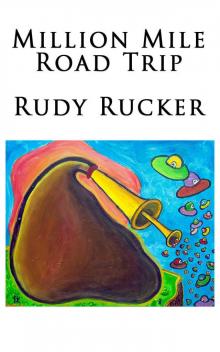 Million Mile Road Trip
Million Mile Road Trip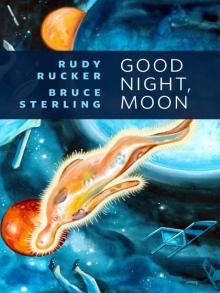 Good Night, Moon
Good Night, Moon Transreal Trilogy: Secret of Life, White Light, Saucer Wisdom
Transreal Trilogy: Secret of Life, White Light, Saucer Wisdom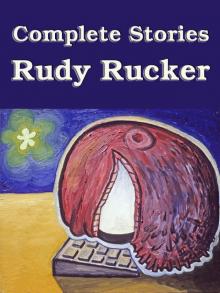 Complete Stories
Complete Stories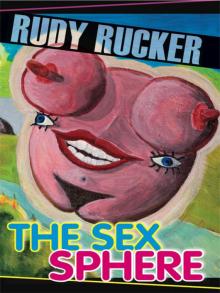 The Sex Sphere
The Sex Sphere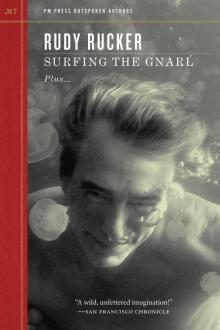 Surfing the Gnarl
Surfing the Gnarl Software
Software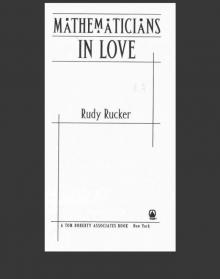 Mathematicians in Love
Mathematicians in Love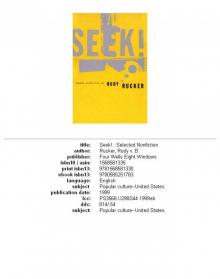 Seek!: Selected Nonfiction
Seek!: Selected Nonfiction The Secret of Life
The Secret of Life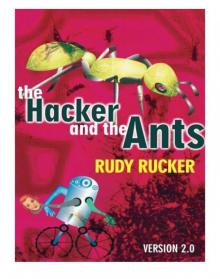 The Hacker and the Ants
The Hacker and the Ants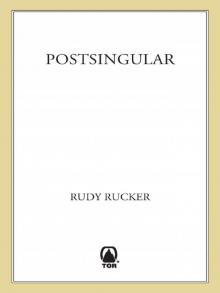 Postsingular
Postsingular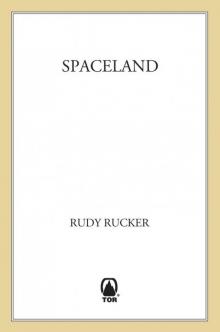 Spaceland
Spaceland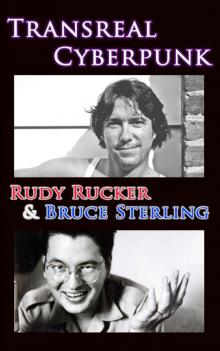 Transreal Cyberpunk
Transreal Cyberpunk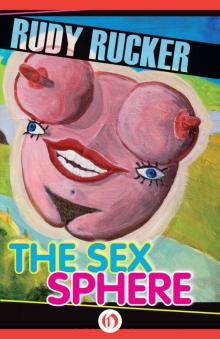 Sex Sphere
Sex Sphere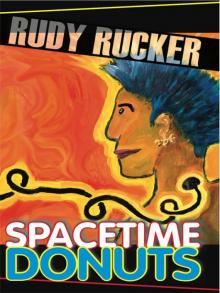 Spacetime Donuts
Spacetime Donuts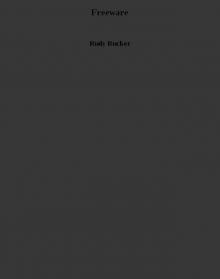 Freeware
Freeware The Ware Tetralogy
The Ware Tetralogy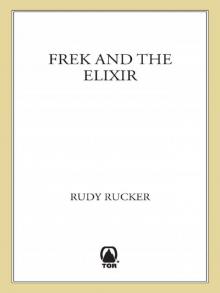 Frek and the Elixir
Frek and the Elixir Junk DNA
Junk DNA White Light (Axoplasm Books)
White Light (Axoplasm Books)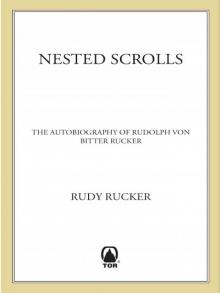 Nested Scrolls
Nested Scrolls Inside Out
Inside Out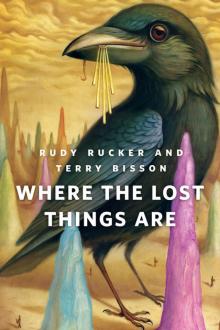 Where the Lost Things Are
Where the Lost Things Are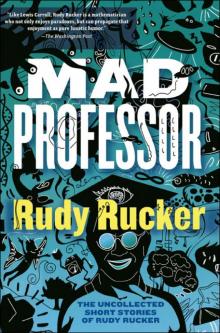 Mad Professor
Mad Professor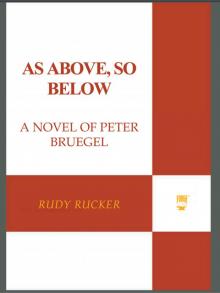 As Above, So Below
As Above, So Below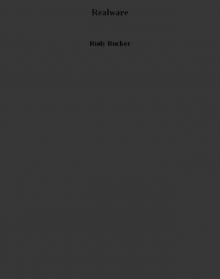 Realware
Realware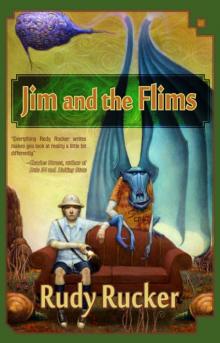 Jim and the Flims
Jim and the Flims Master of Space and Time
Master of Space and Time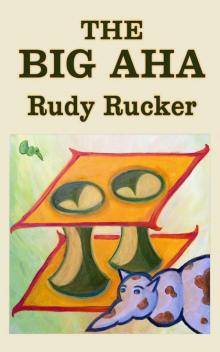 The Big Aha
The Big Aha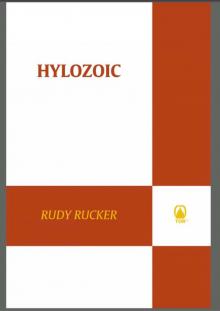 Hylozoic
Hylozoic